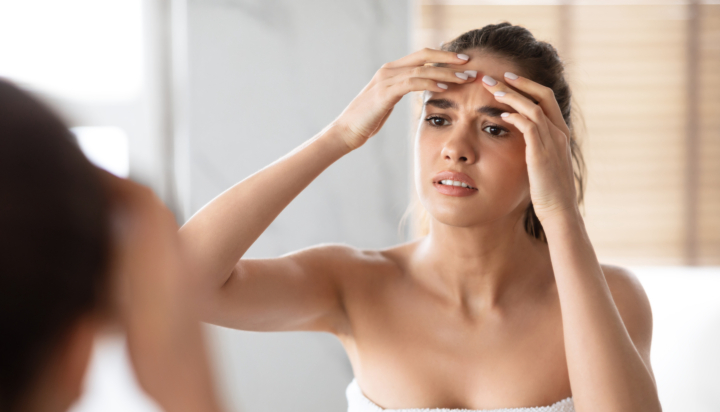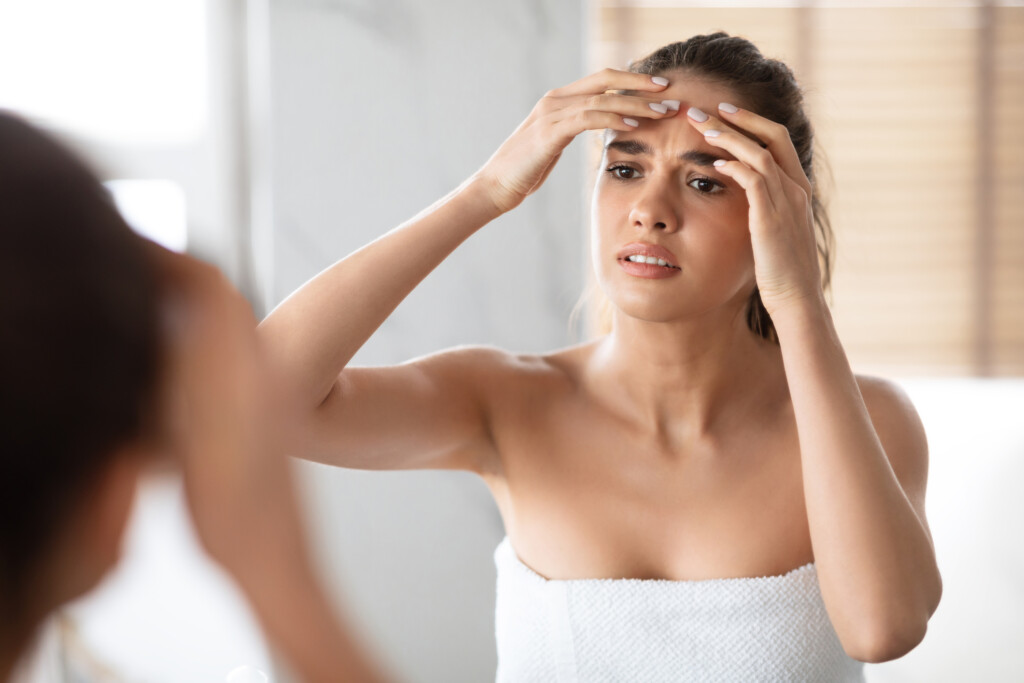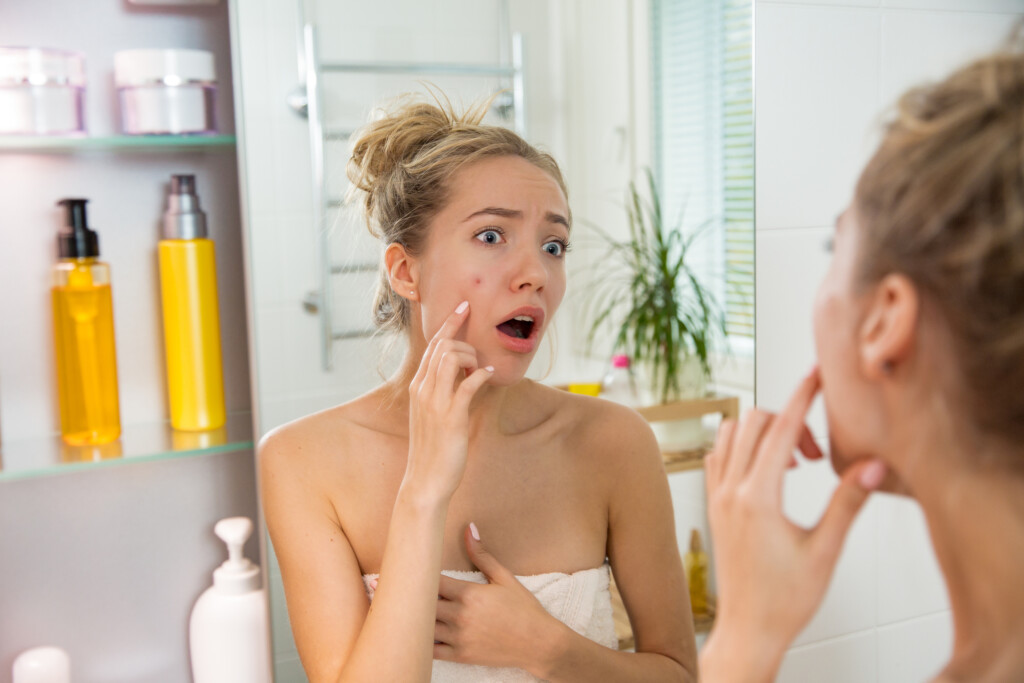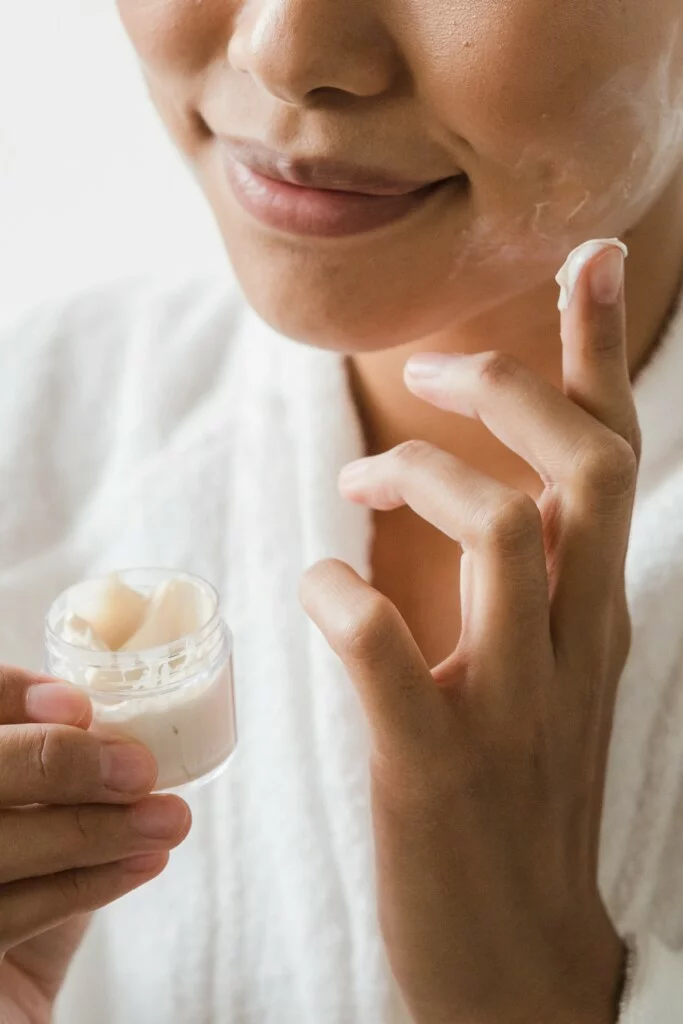
You don't need a cycle tracking app to know when your period is coming - just look in the mirror. There it sits, right on your chin: a pimple that settled on your face overnight and doesn't want to go away anytime soon.

You're not alone with this problem. Medical studies have now established that cycle-related hormonal fluctuations significantly affect our skin. Many women experience typical patterns in the form of blemishes throughout their cycle.
This gives you a crucial advantage: scientific findings guarantee a certain degree of predictability. So, if your skin only reacts to certain changes during a specific phase of your cycle.. acne If you are prone to blemishes, you can accurately predict when your pimples will appear and ideally take preventative measures.
How this works and how you can do your skin a favor even in difficult times is explained in our article about pimples after ovulation.
Ovulation and acne: These hormones affect your skin
Every month, the female body realigns itself by going through the four phases of the cycle – from menstruation (approx. days 1-6), follicular phase (approx. days 6-11), ovulation (approx. days 12-16) to luteal phase (approx. days 17-28) – producing different sex hormones in the process. This creates a unique internal timekeeping system that has nothing to do with the 24/7 rhythm of our working world.
The cycle begins with menstruation. During this phase, the body produces increased amounts of the female sex hormone estrogen. Estrogen acts as a mood regulator in the emotional part of your brain – which also explains why you feel so incredibly good in the first half of your cycle. Researchers also assume that estrogen has an inhibitory effect on your sebaceous glands and additionally promotes good collagen production in your skin. The androgen, which is mistakenly labeled as 'male', also plays a role testosterone It increases significantly in the first half of the cycle until ovulation and boosts your libido.
After ovulation, progesterone is added to the hormonal mix, while at the same time the strongest of the three naturally produced estrogens – estradiol – slowly declines until the next period. These fluctuations go unnoticed in some women, but in most they manifest as mood swings and acne.
During this phase of your cycle, your skin is prone to blemishes
Especially in the second half of your cycle, the luteal phase after ovulation, you may experience an increase in breakouts. You can mark the period between days 17 and 28 of your cycle on your calendar, as this is when your unfavorable hormonal balance leads to your lowest point in terms of breakouts impure skin.
But why is this the case? The cause of your skin blemishes lies in the drop in estrogen and testosterone production after ovulation (without conception). This is followed by a surge in progesterone, which stimulates the sebaceous glands. As a result, your skin becomes oily more quickly, and bacteria thrive in the increased body temperature.
Before your period starts, all your sex hormones plummet, which is directly reflected in your skin. If you naturally suffer from oily skin, you'll often experience blackheads and hormonally induced breakouts after ovulation during this phase. But even women with drier skin can expect unpleasant skin irritations like eczema, psoriasis, or intense itching during the luteal phase.
Sometimes skin problems can even indicate a hormonal imbalance – for example, a thyroid disorder or polycystic ovary syndrome (PCOS). If your cycle-related skin problems are particularly severe, you should definitely consult a dermatologist – they can also help you with your [unclear - possibly "menstrual cycle problems"] Determine skin type.
But even without a diagnosis, you may be able to benefit from cosmetic treatments such as.. Microdermabrasion Berlin Mitte or a Aquafacial Berlin Mitte Benefit from these products, which will help your inflamed pimples clear up faster after ovulation during the luteal phase. For example, your skin will be more comfortable during.. Microdermabrasion Through the painless removal of dead skin cells, the skin is stimulated to form new and stronger cells. Do you want to do something good for your skin in the first half of your cycle? Microneedling Berlin Mitte It tightens your skin and helps to regenerate (acne) scars, wrinkles or sun-damaged skin areas.

Ovulation acne: Solutions for skin blemishes after ovulation
If you want to avoid hormonal preparations like the pill, there are still things you can do to alleviate and detect cycle-related skin problems early.
Step 1: Get to know your cycle
Knowledge is power. If you're not already using a cycle-tracking app, you should definitely download Clue, Ovy, or FLO. These apps not only calculate your next ovulation but also let you record how your skin feels on a particular day.
Observe and note down exactly how your skin changes throughout your cycle. When does it look its best? When is your complexion uneven? Are breakouts before or after ovulation the problem?
The better you understand your cycle and your skin, the more control you have over ovulation breakouts and can react more calmly when monthly blemishes suddenly reappear on your face.
Step 2: Analyze your lifestyle
It is now well-established that lifestyle has a significant impact on our skin. While some women react to excessive sugar with skin problems, others develop breakouts when they consume dairy products like yogurt or cheese. It's also no secret that alcohol and cigarettes further weaken the skin barrier and promote inflammation, while fresh fruits and vegetables, as well as nuts, are beneficial beautiful skin from the inside Stress also has a negative impact on your skin, leaving its mark with consequences such as lack of sleep, a poor skincare routine, and nighttime fast-food excesses.
Try to document not only your cycle but also your lifestyle for one to three months to rule out a connection between poor diet, alcohol consumption, and cycle-related breakouts. Are there any foods that worsen or improve your skin? What skincare products do you use and how does your skin react to them? How much sleep do you get each day, and do you spend time outdoors?
Step 3: Take concrete measures against post-ovulation acne
You know when your luteal phase begins and you already pay meticulous attention to your lifestyle – but those annoying pimples after ovulation just won't go away? Then it's time to actively do something for your skin and use peels, masks, or an appointment at your favorite beauty salon.
For example, gentle scrubs with salicylic acid help to unclog pores by removing dead skin cells, sebum, and dirt. Also, the rule of thumb is: touch your face as little as possible, because your fingers harbor many bacteria that can further promote breakouts. If you are still prone to breakouts.. acneWe advise you to use SOS care products with zinc or to use antibacterial agents that reduce inflammation and accelerate healing.

Acne during ovulation: Conclusion on hormonally related skin impurities
The female cycle not only affects our well-being and energy levels, but also our physical appearance. The body's own processes Hormones They constantly send signals to the brain, determine how much fat we have, make us laugh, and change our skin. It's all the more surprising, then, that we often forget this natural process when it comes to a holistic view of our health.
In this article, we've given you an initial overview of the four phases of your menstrual cycle and the hormones that flow through your body during this time. To understand in the long term why breakouts occur particularly during the ovulation and luteal phases, it's essential to learn more about your cycle. You can do this by using period-tracking apps or keeping a physical cycle diary. Books like those by Sina Oberle can also be helpful The cycle code or The power of your cycle Nora Konrad's methods are suitable for developing your own holistic concept for greater well-being.
It's important not to stress unnecessarily if one of those pesky blemishes reappears on your face. Even the best preventative measures can't always stop breakouts after ovulation. If you feel the need for a treatment like this during this sensitive phase of your cycle, Acne treatment Berlin If you long for it, don't hesitate to contact us and come visit our studio in Berlin Mitte.